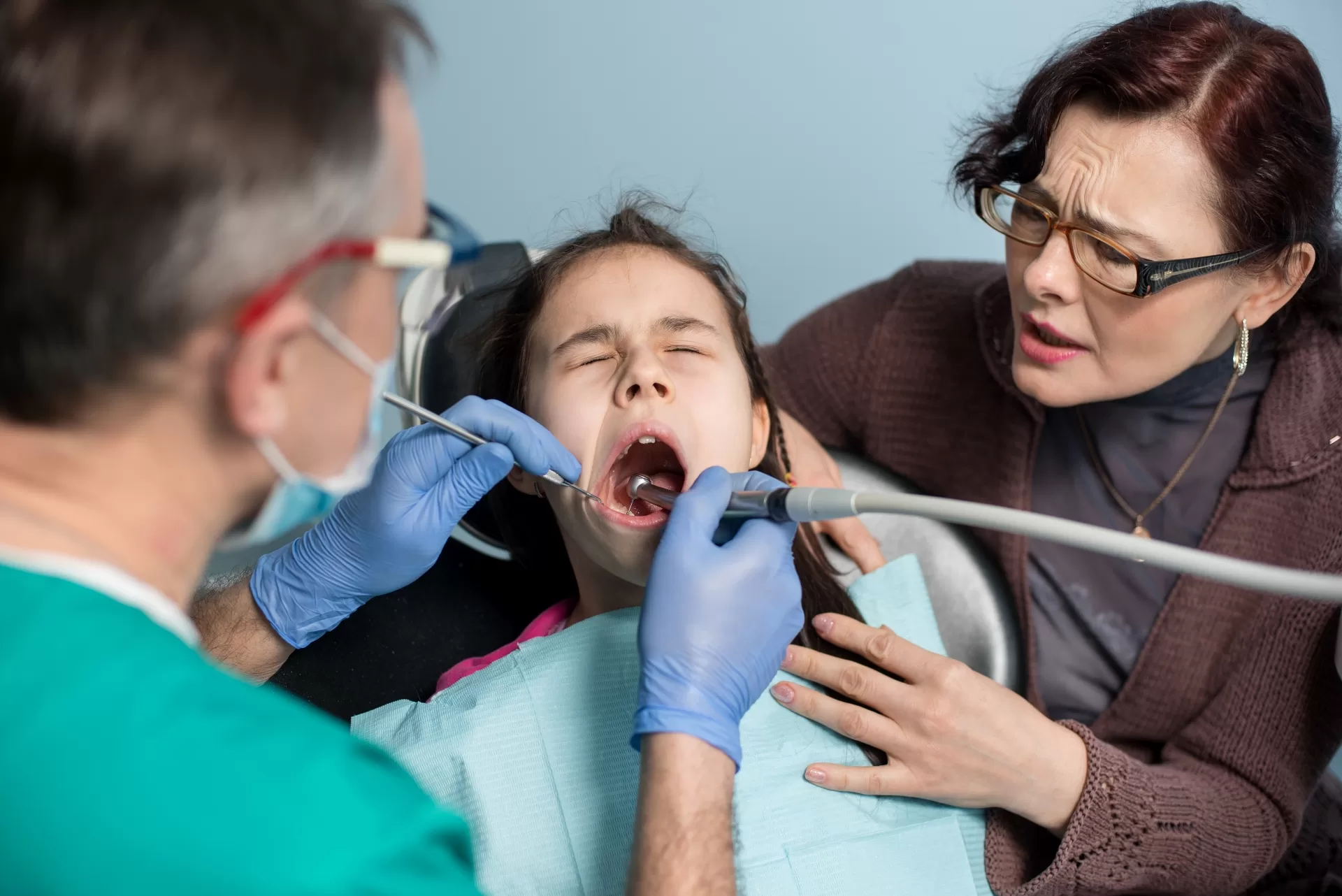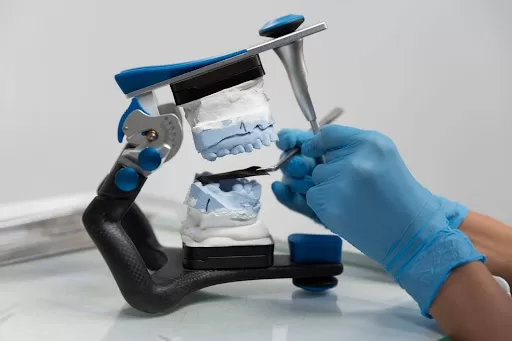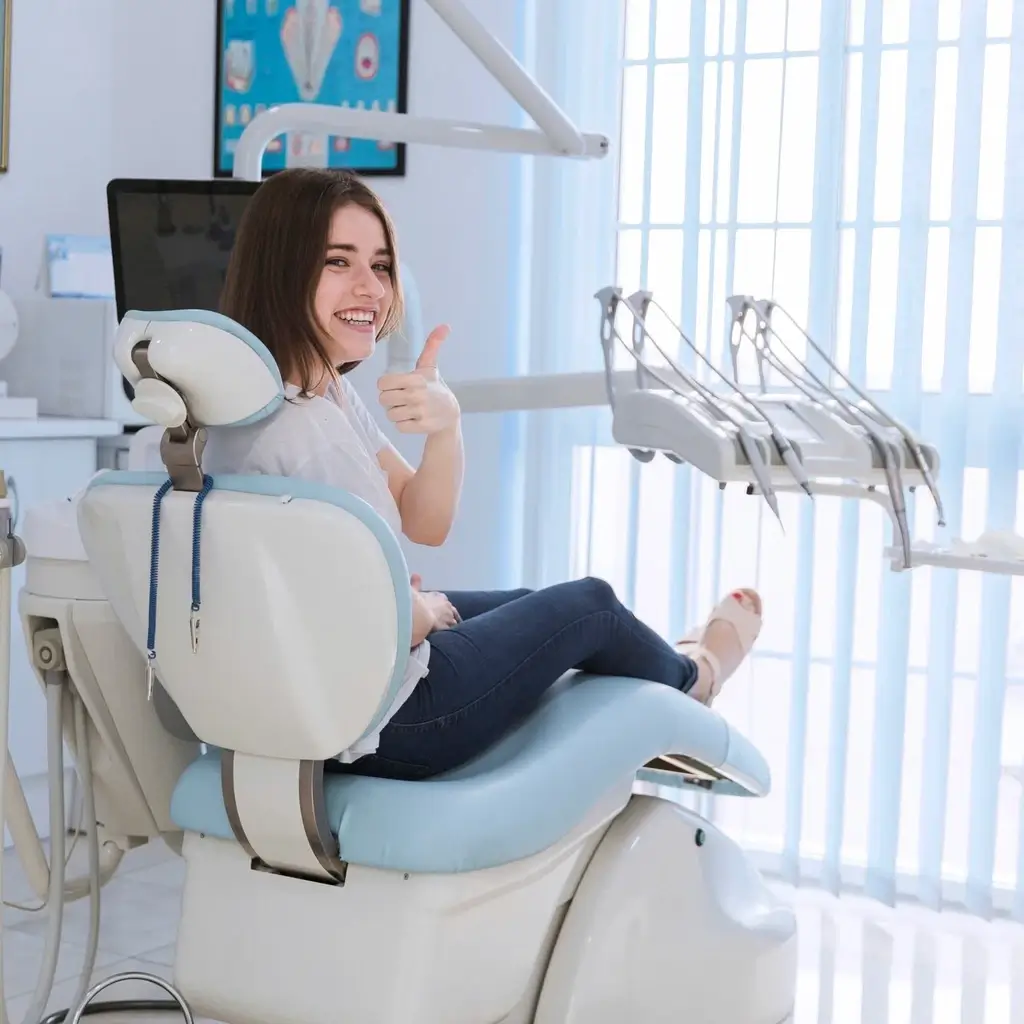What are wisdom teeth and why are they often a problem?
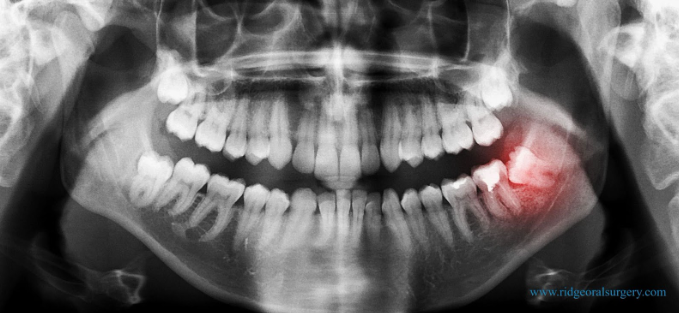
Wisdom teeth are the third set of molars that usually emerge in your late teens or early twenties. They’re located at the very back of your mouth and are the last teeth to erupt in the oral cavity, typically around the age of 17-25.
What are impacted wisdom teeth?
With evolution, over the past many generations, humans are eating a progressively softer diet leading to a smaller sized upper and lower jaw and decreased space for all the teeth to fit in. As wisdom teeth are the last permanent teeth to erupt (enter behind the upper and lower second (or 12-yr) molars, 9 out of 10 people will not have enough space for Wisdom teeth to erupt properly and they become Impacted or malpositioned. The word impacted, literally means “stuck” or unable to erupt properly. While a small percentage of people never have issues with them, for others, these teeth can be a source of discomfort, infection and many other dental problems. Having them assessed for removal is typically what’s advised.
Below is a summary of the steps you will typically follow on your wisdom teeth removal journey.
Step 1: Identifying the Need for Removal
Step 2: Initial Consultation with a Dentist or an Oral Surgeon
Step 3: Treatment Planning
Step 4: The Day of Surgery
Step 5: Post-Surgery Recovery
Step 6: Follow-Up Visits
Step 1: Identifying the Need for Removal
Figuring out whether your wisdom teeth need to be removed is the first step. Here’s some of the ways you can identify if it’s time to say goodbye to those back molars.

Recognizing Signs and Symptoms of Problematic Wisdom Teeth
Your body often tells you when something’s off with your wisdom teeth. Keep an eye out for these red flags:
- Tooth pain or Jaw Ache: Discomfort around the back of your mouth is a common sign.
- Swelling or Redness: If the gums around your wisdom teeth are swollen or red, it is often a common signal.
- Difficulty Opening Your Mouth: Trouble with jaw movement can be sometimes related to wisdom tooth issues.
- Bad Breath or Unpleasant Taste: These can be signs of infection caused by partially emerged teeth that are hard to clean.
- It is very important to note, that in most cases the consensus is not to wait for symptoms to happen, and remove the wisdom teeth preventatively if it is determined via consultation by your oral surgeon that they are likely to cause problems in the future.
Importance of Regular Dental Check-Ups in Early Detection
Often, wisdom teeth problems can sneak up without obvious symptoms. That’s why regular dental check-ups with your General Dentist are extremely crucial. Your dentist can spot potential issues early on, often before you feel any discomfort. X-rays taken during these visits are especially helpful in seeing what’s going on beneath the gums. Typically, your general dentist may recommend an evaluation with an Oral & Maxillofacial Surgeon to determine the exact recommendations.
Step 2: Initial Consultation with an Oral Surgeon
Once you suspect your wisdom teeth might be causing issues, the next step is setting up a consultation with an oral & maxillofacial surgeon.

Scheduling a Consultation and What to Expect
A referral by a General Dentist is appreciated but is not necessary to be seen by a board certified Oral & Maxillofacial Surgeon at Ridge Oral Surgery & Dental Implants. At Ridge Oral Surgery & Dental Implants, we often see patients with and without referrals. Please book an appointment specifically for wisdom teeth evaluation. During this visit, your surgeon will conduct a thorough examination of your mouth and discuss your symptoms and concerns. This will be followed by a discussion of the common reasons to remove wisdom teeth and how that applies to your particular situation. Finally, a personalized treatment plan will be formulated by your surgeon in consultation with the patient and patient’s family (in the case of a minor). We typically spend quality time with the patient and answer any questions or concerns that arise in detail. Here are some further details that will be discussed during that appointment:
Dental & Medical History
Please be ready to talk about your dental and medical history in detail. Your surgeon needs to know about any past dental work, allergies, medications you’re taking, and any health conditions you have. This information helps in planning the safest and most effective approach for your wisdom teeth removal.
X-rays and Dental Examinations
X-rays are very important in this step. They give your dentist or surgeon a view of the jaw bone structure and the available space as well as the status of development of the wisdom teeth under the gum line to see the position, size, and shape of your wisdom teeth and how they’re situated in your jaw. These images aid in understanding what’s going on and planning your treatment. The dental examination also helps in checking the health of the surrounding teeth and gums.
Potential Consequences of Not Removing Wisdom Teeth
Following are the most common reasons wisdom teeth will cause problems and will need to be removed:
- Infections (Pericoronitis) This is the most common way for wisdom teeth to cause pain or infection. Typically a tooth that breaks through the gum partially will have a gum fap overlying the tooth, leading to a food trap. The symptoms typically start as small episodes of pain and swelling that come and go, and at some point the infection can become severe, leading to pain and swelling in surrounding critical structures (neck, face, eyelids etc), which may necessitate admission and treatment in a hospital setting
- Tooth Decay, Gum Disease, Damage to adjacent teeth: Typically there is a gum pocket between the wisdom teeth and teeth in front, creating “Food traps” and ”Hard-to-clean’ ‘ areas that become breeding grounds for bacteria and infection. This can lead to cavities and infection/damage to not only wisdom teeth but the second molars (teeth in front of the wisdom teeth) as well. In some cases, waiting too long may lead to the need for removal of additional teeth (typically second molars) along with the wisdom teeth. Wisdom teeth are typically non-functional as they are impacted, and ideally we do not want to lose functional teeth (second molars) because of non functional teeth (wisdom teeth)
- Cysts & Tumors: Around 1% of Impacted wisdom teeth can lead to formation of cysts or tumors (rarely cancer) that are slow growing and can often damage jawbone and other adjoining teeth, resulting in need for major surgery and reconstruction (More detailed separate?)
- Alignment Issues: As the wisdom teeth try to grow in with insufficient space for them to fit properly, that can put pressure on adjacent teeth, that can cause overcrowding and undo years of orthodontic work. This leads to need for redoing the Ortho Treatment after removal of wisdom teeth. Also, increasing number of older adults are undergoing Braces or orthodontics and even if not causing any symptoms, the wisdom teeth may need to be removed to provide enough space for alignment of the rest of the teeth
- TMJ pain / Headache: There is some evidence that in select cases the removal of wisdom teeth can help with TMJ pain or headaches with no identifiable cause or origin
Step 3: Treatment Planning

At this point in your consultation, it’s time to plan out the best course of action. Your surgeon will discuss the different surgical options and the available anesthesia options as well. This step helps you make informed decisions and prepare for the next steps.
Discussing Options: Monitoring (No treatment), Removal, or Other Treatments
Your surgeon will lay out your options. Sometimes, if your wisdom teeth aren’t causing immediate problems, monitoring them over time might be suggested, especially if they are close to the anatomic structures (Lower Jaw nerve or Upper Jaw sinus).
However, if they’re likely to cause issues or are already problematic, removal is usually recommended. Alternative treatments might be discussed, depending on the complexity of your situation. The risks, benefits and alternatives of watchful monitoring (No immediate treatment), removal of one tooth at a time, removal of one side at a time, removal of all 4 wisdom teeth at the same time will be discussed in detail, along with the different anesthesia options (Local anesthesia, Nitrous Sedation, IV sedation, General Anesthesia).
Understanding the Risks and Benefits of Removal
It’s important to weigh the pros and cons of wisdom teeth removal. On the plus side, removal can treat and prevent any future dental issues (pain, infection, gum disease, relapse of overcrowding, cysts and damage to other teeth, etc). Also, like any surgery, there are always at least some risks involved. For wisdom teeth removal, that discussion will be focussed on the risks associated with surgery as well as with the different anesthesia options as it applies to your particular case.
Anesthesia: Safety of different types of anesthesia will be discussed (Local anesthesia, Nitrous Sedation, IV sedation, General Anesthesia). Decisions will be made based on your detailed medical history, physical and radiographic examination as well as the level of anxiety.Surgery: The discussion will include the Standard Risks/Benefits/Alternative, such as a small chance of injury to the nerve of the lower jaw and the upper jaw sinus that are in close proximity to the wisdom teeth and there is usually a small standard risk of injury. The short and long term consequences (related to nerves of the lower jaw/tongue and sinus in the upper jaw) along with post surgical instructions as well as possible post-surgery complications like dry socket and infection will be discussed in detail.
Your Oral Surgeon will walk you through these risks and benefits to help you make an informed choice.
Pre-Operative Instructions
On the day of your surgery, it’s important to follow the instructions your surgeon gave you during the pre-op consultation. These typically include:
- Fasting: You’ll likely need to fast for a certain number of hours before the surgery, if you’re receiving IV sedation / anesthesia. This means no food or drink, not even water for at least 8 hours prior. We will typically schedule sedation procedures in the morning, and that means nothing to eat or drink after midnight the night before and no breakfast or water in the morning.
- Arranging Transportation: After IV sedation, you cannot drive yourself and will need someone over 18 yrs old to drive you home. Since you’ll be groggy and not in a state to drive after the procedure, make sure you have someone lined up to take you home (A friend or family, NOT a cab).
- Wear Comfortable Clothing: Choose loose, comfortable clothes for the day of your surgery. Avoid wearing jewelry, contact lenses, or makeup.
Overview of Anesthesia Options
You’ll typically have a few choices for anesthesia, depending on your specific case and preference:
- Local Anesthesia: Numbs just the area around your wisdom teeth.
- Nitrous Oxide Sedation: You’ll be conscious, but relaxed, you can drive yourself after.
- IV sedation Anesthesia: You’ll be completely unconscious/Unaware during the surgery. You CANNOT drive yourself after surgery.
Your surgeon will recommend the best option for you and explain what to expect.
Step 4: The Day of Surgery
The day you get your wisdom teeth removed is finally here! Here’s what you need to know to make sure everything goes smoothly.
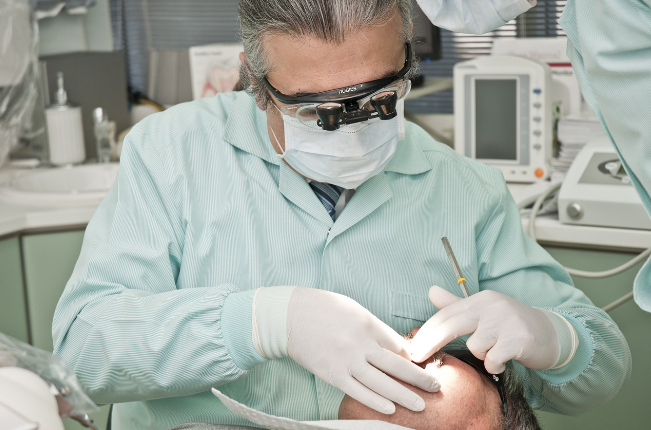
The Surgical Procedure
Here’s a quick rundown of the actual surgery:
- After the anesthesia kicks in, your surgeon carefully checks all the surgical sites for numbing and will make an incision in the gum tissue to expose the tooth and bone.
- Any bone blocking access to the tooth root will be carefully removed.
- The tooth may be carefully divided into smaller pieces for easier removal.
- Once the tooth is out, the site is cleaned of debris from the tooth and bone.
- The wound is stitched (usually dissolvable sutures) up to promote healing, with gauze placed over the site to control bleeding and help a blood clot form.
Remember, this is a routine procedure, and your dental team is there to make it as comfortable as possible. The surgery itself usually takes about 45-60 minutes, but it can vary depending on the number and complexity of the wisdom teeth being removed and the anesthesia option chosen.
Step 5: Post-Surgery Recovery
After your wisdom teeth are out, the focus shifts to your recovery. This period is all about taking it easy and making sure you heal up right. Here’s what you need to know.

Immediate Post-Operative Care
Once the surgery is over, it’s time to kick back and rest. Your body needs time to heal, so take it easy for the next few days. Here’s what else you should do:
- Managing Bleeding: Some bleeding is normal. Bite gently but firmly on the gauze pad to reduce bleeding and help a clot form. Change gauze as instructed.
- Reducing Swelling: Expect some swelling around your jaw. Swelling typically peaks day 3 and then improves. May take 5-7 days for complete resolution. You can use an ice pack on the outside of your face for the first 48 hours (20 mins on and off) to help bring it down. Can also use 1-2 extra pillows the first couple nights to help reduce swelling (elevate the head).
- Numbness: Some numbness is normal for a few hours post operatively. Be careful to not bite into the lip/chin/tongue. That’s why we recommend a liquid diet for the rest of the day (after the procedure).
Pain Management
You’ll likely have some discomfort once the anesthesia wears off. Here’s how to manage it:
- Medications: Typically you will be prescribed Antibiotics, pain meds and an Antibiotic rinse. Pain meds: Some pain is expected. Typically, safer, non-narcotic options (Ibuprofen & Acetaminophen aka Tylenol) are preferred over stronger medications. Unless any contraindications, we recommend taking them together (Ibuprofen+Tylenol) on a scheduled basis (every 4-6 hrs while awake). Antibiotics: Are prescribed to prevent or treat infection or both. We do recommend over the counter probiotics to be taken with antibiotics. Antibiotic Rinse: If prescribed, start using post op day 3, and stop using after 2 weeks. Specific instructions for your case will be provided by your doctor before discharge.
Diet and Nutrition
Eating right is key to healing, but you’ll need to stick to specific kinds of foods:
- Safe Foods: Start with Cold liquids and soft foods. Think Ice cream, shakes, yogurt, Jello, pudding, and applesauce etc. Gradually add semi-soft foods as you can tolerate them (overcooked pasta, mashed potato, scrambled eggs etc)
- Avoid Certain Foods: Stay away from hot, chewy, spicy, or hard foods, anything crunchy or with small pieces and don’t use a straw for the first 5-7 days as the sucking actions can dislodge the blood clot and lead to a dry socket.
The first few days after surgery are crucial for your recovery. Follow these tips, and don’t hesitate to contact your dentist if you have any concerns. Taking care of yourself post-surgery is just as important as the surgery itself for getting back to normal quickly.
Step 6: Follow-Up Visits
We will typically schedule your follow up 1 week after the surgery to make sure everything is healing well. If you need anything at all prior to your appointment, please feel free to reach out via text or call our after hours emergency line.
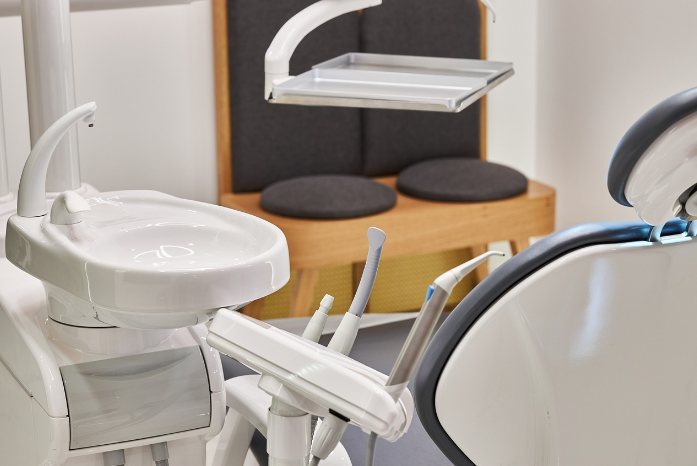
The Importance of Check-Ups
Your surgeon will check for any signs of infection, make sure that the healing is on track, and answer any questions or concerns you might have. Skipping these could mean missing out on spotting potential issues early. These follow-up visits are a crucial step in closing the chapter on your wisdom teeth removal. They’re there to make sure you are healing properly and to set you up for success.
Understanding the basics about wisdom teeth, and the steps involved can help ease any anxieties about the procedure and prepare you for what lies ahead. Remember, wisdom teeth removal is a very commonly performed procedure, and with proper care, recovery is usually smooth and uneventful. We hope this step-by-step guide helped answer some of your questions and alleviate some of the anxiety associated with the process. We assure you that the team at Ridge Oral Surgery & Dental implants will be at your side every step of the way!


